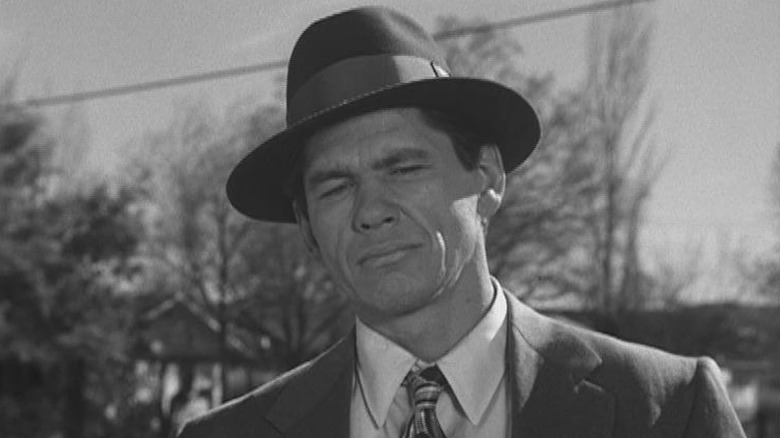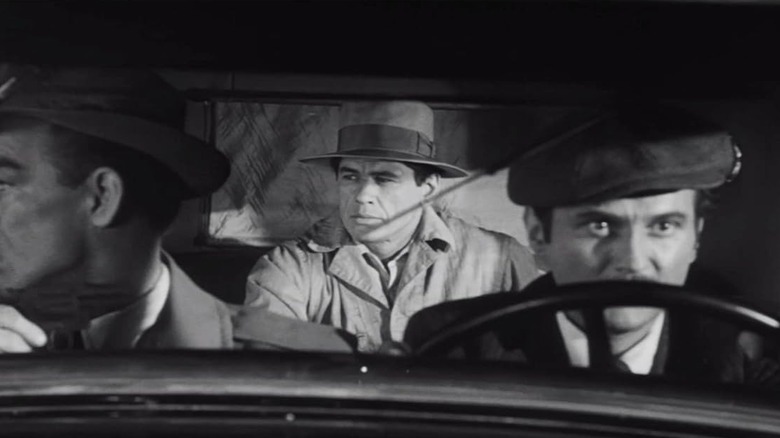A Low-Budget Crime Thriller Turned Charles Bronson Into A Superstar
Charles Bronson could not happen today. Born to Lithuanian immigrants in 1921, Brosnan began working in a Pennsylvania coal mine at the age of 12 to help maintain the family's income after the death of his father. It was a miserable existence. The Great Depression hit his family hard. Meals could be scarce and shelter seemed ever endangered. Despite these hardships, Bronson managed to graduate from high school and ultimately left Appalachia to serve as an aerial gunner in the U.S. Air Force during World War II.
After the war, Bronson moved to Hollywood and studied acting. At 5 '8," he was not an overpowering presence, but there was a coiled intensity to his early performances that must've been rooted in the tension of his hard-working childhood. Bronson felt determined, formidable — and, in many of his early roles, shockingly vulnerable.
Bronson was not a method actor, but he took his craft very seriously. He studied sign language to pull off his performance as Igor, the deaf-mute assistant to Vincent Price's nefarious Professor Henry Jarrod in Andre de Toth's "House of Wax." It was surprisingly nuanced work for a minor character in a B horror movie, and it landed the up-and-coming actor a series of roles that led to his breakout performance.
It wasn't easy for someone with Bronson's hard, not-exactly-handsome visage to become a star in the 1950s and 1960s (he was probably best suited to character parts in a Western TV show like "Gunsmoke"), and it would be absolutely impossible today in our age of baby-faced superheroes. In fact, Bronson only landed his star-making role because another actor dropped out. It worked out for both men, though, because as much as I adore the actor who turned down the part, I think he would've been all wrong as George "Machine Gun" Kelly.
Bronson's Machine-Gun Kelly was the meek antithesis of Death Wish's Paul Kersey
Roger Corman was only three years into his career in 1958, but, remarkably, he had already directed close to 20 feature films. He worked fast and cheap and generally delivered watchable entertainments. He targeted younger moviegoers with B-flicks that romped about in tried-and-true genres like Westerns, horror, and, as was particularly hot at the time, juvenile delinquent dramas. So, when he decided to make "Machine-Gun Kelly" (based on the bullet-whizzing exploits of the Tennessee-born bank robber), he initially envisioned Dick Miller in the titular role. When Miller declined, Corman turned to Bronson.
If you're thinking "Machine-Gun Kelly" was ground zero for Bronson's taciturn tough-guy act, which earned him a long-running franchise via his portrayal of Paul Kersey in Michael Winner's "Death Wish" (though the Kersey of the first movie is not the stone-cold, quippy killer of the sequels), you're wrong. The Kelly of Corman's film is a cuckold who's easily manipulated by the Lady Macbeth-like Flo Becker (a terrific Susan Cabot). Bronson is weak, whiney, and ultimately pathetic. Corman has said that he wanted to make the movie because he loved the name (very marketable!) and was intrigued by how Kelly did not live up to his fearsome moniker.
"Machine-Gun Kelly" was successful in the United States but found genuine critical favor amongst the Cahiers du Cinéma set. Though Corman shot the movie in only 10 days, it looks like a regular-budget studio programmer and moves like greased lightning through its 80-minute runtime. It's my favorite Corman film of the 1950s next to the celebrated "A Bucket of Blood" (which stars Miller), and it led directly to Bronson getting cast in John Sturges' big-budget Western hit "The Magnificent Seven." If you grew up on Bronson's humorless, hacky '80s action output, give "Machine-Gun Kelly" a whirl. The man was one hell of an actor before he became a punk-blasting vigilante movie star.

